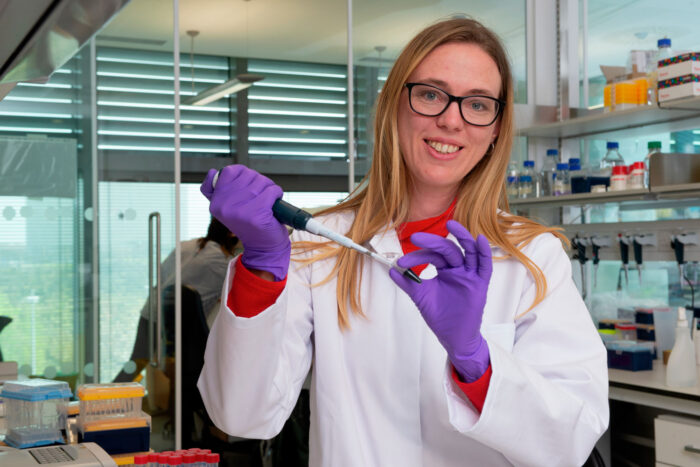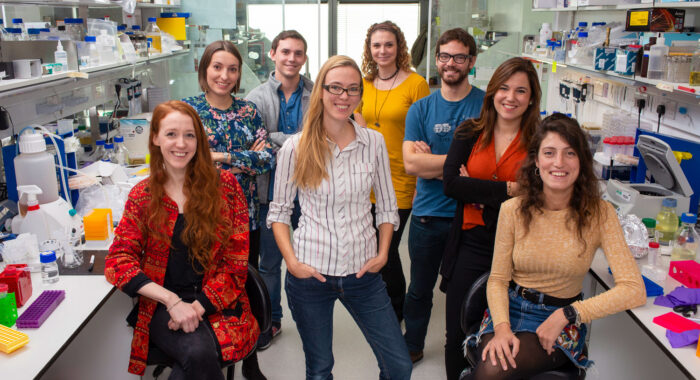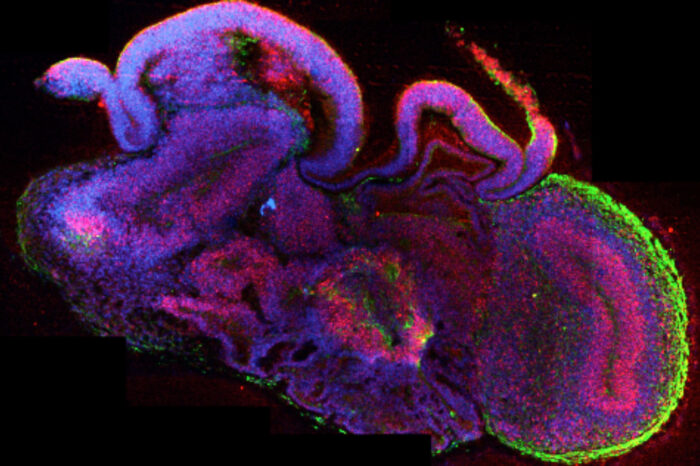From the scientist’s view: a conversation with … Madeline Lancaster

Madeline Lancaster is a Group Leader in the Cell Biology Division at the LMB.
She did her PhD in the University of California, San Diego, in the lab of Joe Gleeson, where she studied cilia and their role in development and adult homeostasis. She then moved to the Institute of Molecular Biotechnology (IMBA), Vienna, Austria to do a postdoc in Jürgen Knoblich’s lab, where they created a method to look at developing human brain tissue in a dish, called cerebral or brain organoids. She started her own lab in 2015, when she joined the LMB.
Madeline’s group are now using brain organoids to look at human development and evolution. They are focused on understanding the human brain and what sets our brains apart from that of other mammals and other apes. They are interested in human brain evolution and looking at the cell biology during early brain development that sets up our greatly expanded brains.
We recently talked to Madeline about her scientific career and research.
What is your earliest memory of science or scientific discovery?
My father is a scientist. So, I grew up with science around me all the time to be honest. I remember visiting his lab a lot. And I remember very vividly seeing, for example, his lightbox on his desk with all of his slides – actual slides back then – you know setting up his talks, and he would show me some of his exciting new findings. He was primarily a chemist, so his lab was really exciting because it was full of lots of fancy chemistry equipment. But I remember very well going into the lab and looking in a microscope and seeing a neuron for the first time with him, and that really stuck with me.
What inspired you to choose this particular area of science/research?
I became interested in the brain, also at a very young age, because of my mother. She is a psychiatrist and so I would also go with her sometimes to her work and sit in the waiting room and see some of the patients that she was treating. Patients with schizophrenia and bipolar, and really severe neurological conditions like that, and I think that stuck with me. I always wondered how is it possible for us humans to have such rich cognitive abilities, and yet at the same time be susceptible to these, kind of, horrific disorders. So, I wanted to understand how the brain works and hopefully that information might give us some new treatments for some of those conditions.
What is the most exciting thing about your work/research?
I think the question of how the human brain really is different than those of our closest living relatives, like chimpanzees and gorillas, is one that has been asked for millennia really. I think some of the recent findings, really identifying a cell biological mechanism that helps explain how the brain actually expands in humans specifically, is just so exciting because it starts to really answer that question that really hasn’t had any new insight for a very, very, long time.
Has there been a pivotal experiment or moment that really moved your research and understanding forward?
I think the most pivotal moment in my career was the first time I looked through a microscope and saw brain organoids, what we would then call cerebral organoids, first forming in a dish. Realising that we could actually make brain tissue in a dish and we could then use it to start asking questions that were impossible previously. That really opened up a whole new area of exploration for my lab and I think also for others around the world.
Has there been an experiment or piece of work that didn’t go to plan, but turned out to have a positive, if unexpected, outcome?
The experiment that was most pivotal in my career, was also the experiment that actually did not go as planned. I was actually not trying to make brain organoids when I did those experiments. We were trying to work with neural stem cells in a dish, trying to do more typical kinds of experiments with cells cultured on standard petri dishes. And so, the formation of these three-dimensional tissues spontaneously was not expected, but very exciting. And from there we went with it, and continued to establish the methods to generate these tissues more reproducibly and to start asking these big questions.
Who has been the biggest influence on your scientific career?
It’s difficult to point to one person who has made a major impact on my career. I think it’s really been almost like a team effort. I’ve had a lot of people who have influenced me over the years. I think my family first of all. Both my father and my mother being scientifically trained, that was a really important influence on my early life as a budding scientist. And then later in my education, my PhD advisor as well as my postdoctoral advisor Jürgen Knoblich who really allowed me the freedom to take on really exciting, and challenging, and risky projects, that wouldn’t have been possible in a lot of other laboratories I think. And then of course, in my own laboratory as well, I have a really fantastic, supportive group of colleagues who I turn to all the time for input, here at the LMB.

What drew you to want to come to LMB and what is special about working here?
The LMB is probably the most special place in the world for scientific research. The freedom that we have here to ask questions that are often difficult to get funding for in more traditional settings. That opens up areas of exploration that are impossible in most other institutes in the world. And having the freedom and the ability to really focus on the science, without other sorts of distractions, especially in today’s day and age where we have so much else going on besides just the science, and here I’m sort of buffered from all of that and that is clearly having a very strong effect on the science in my lab, and bringing it to new levels that I think would have been difficult in other places.
What do you think makes a good scientist?
I think a good scientist needs to be curious and creative. I think those are probably the most important two qualities. It helps to be smart, but I think that actually Einstein even said that creativity was one of the most important features, and I completely agree with that, because you have to, first of all, be curious and willing to explore uncharted territory and then you have to be creative in order to come up with new ways of interpreting the data, in order to develop new hypotheses that are not necessarily a straight line from the observation. And I think those qualities are really what I’ve tried to nurture in myself and others in my lab as well.
What scientific breakthrough would you most like to make?
One of the biggest questions in my field – in the field of development – is what determines body plan organisation, how it develops to become the size and shape that it is. And in particular, we’re interested in the brain, so we want to understand how the human brain size is actually set up. But there’s a more fundamental question there, and that is ‘what determines the developmental timing that sets up the size of the brain?’ Because it’s all about timing at the end of the day. And that is a really big question that I’d like to answer in the future I hope, or at least contribute to that discovery in the future.
Is there a part of your job that might surprise people?
I think a lot of people who are not scientists don’t always know exactly what it is we do in the lab every day. And so, the way I explain it to my family members is, that I move small amounts of liquid from one place to the other over and over and over again. And it might surprise people to know that that’s actually what we do day-to-day, but at the end of the day that’s what biology really is, on a small scale, looking at biological reactions and cells in their environment. And so it doesn’t sound that exciting but at the end of the day the questions we’re asking I think are really big.
Do you remember when your first paper got published?
I remember vividly my first paper. It was actually very difficult to publish. It took about two years from the time we submitted to the time it got published, and in the process a couple other papers came out that kind of scooped us in different ways and it was a really important learning experience. It was during my PhD and the study was focused on the role of the primary cilium in Wnt signalling in the kidney. And it ended up, I think, being a very nice story that I’m really proud of, but it was quite a learning experience. And I feel like after that, I still wanted to be a scientist. That’s when I really knew that this is where I belong.
What has been the biggest challenge in your career?
One of the most difficult things, I think, about being a scientist is actually just keeping track of everything. There’s so many new, exciting studies being published all the time. I have a hard time keeping up with it all! Because in my field and in the broader biology field, there’s always a really exciting new paper coming out every single day, and I can’t possibly keep up with it all. And so, I think the hardest part is actually keeping abreast of all the new and exciting technologies and findings and seeing how it fits in with the work that we’re doing in my lab.

Do you think differently about your job since the outbreak of the COVID-19 pandemic?
There’s a few things that I think the COVID-19 pandemic has made me rethink a little bit. First of all, I’m rethinking a lot of the travel that we used to do; to conferences and things like grant review panels. I think that also, even before COVID-19, I was trying to be more aware of my carbon footprint for example, and I think now I’m realising we don’t need to do all that travelling. And the world is very connected virtually, and I think we should nurture that more in the future and keep that up, because that’s going to be better for us as a planet as well.
Do you think people see or think of scientific research differently since the outbreak of COVID-19?
I hope that since the outbreak of COVID-19 people have changed their opinions of science to some degree. I hope that people have realised how much science has given us. We have several, very successful vaccines now, and that’s all thanks to a very rapid movement in science, sharing data, making sure that the sequences were available for the virus, very, very, early on. And then joining forces. Academia, industry, joining forces to makes these vaccines. I hope that the public now has faith in the scientific community, that we are working for the better good.
How does your research benefit society as a whole? How does your research impact on the non-scientific community?
Most of my research is pretty fundamental, meaning we’re asking really basic questions about biology, about human brain development. But some of our research, I think, can have important impacts in patient’s lives in the future. It’s hard to predict exactly where it will go. But for example, CRISPR was also an area of fundamental biology, scientists interested in bacterial responses to bacteriophages, to viruses, without really knowing whether it would have an impact in people’s lives. And now we have some of the first clinical treatments based on CRISPR. And so I’m hopeful that some of our basic discoveries will also lead to new insight into human disease in the future.
What is your favourite thing to do away from science?
I have a lot of hobbies and things I like to do other than science. Some of them I can do here in Cambridge, but some I can’t. So, for example, I love skiing – that’s a bit difficult in Cambridge. But that’s OK. I go home every now and then and try to go skiing back home in Salt Lake City. And I really like to paint actually. I’m not very good at it! But I enjoy doing a bit of artwork at home and expressing my own creativity.
Has your scientific career been different from what you imagined?
My scientific career has definitely been different from what I expected. I think when I started out, and I knew that I wanted to be a scientist, I thought that I would just be in a lab somewhere, working away day and night, not really talking with people, just kind of doing the experiments. And I was actually happy to see that so many people, non-scientists too, are also very excited about the work that we’re doing and I really enjoy telling the public about it, I enjoy interacting at various public outreach events and telling people about our work. So, I think that was something that was unexpected, but I’m very happy with.
What key piece of advice would you give to someone embarking on a career in science?
I think if I had to give some advice to somebody just starting out as a scientist, I would say that the most important thing to remember is why you’re doing science in the first place. For most of us, it is because of that curiosity, and to remember that feeling, you know, when you discover something new for the first time in your own experiments. And so even though there are difficult times when things aren’t working, or you know when you’ve been working on a project for a long time and somebody else succeeds when you haven’t, try to remember that wonderful feeling when things do go your way and you do make a really interesting new discovery. And even the tiniest little discovery, I think, is important and to remember that that’s why we’re doing this.
Where do you want you research to be in 5-10 years?
I think that if I can achieve one thing in five to ten years it would be something that I can’t predict. Because my own experience has taught me that the really great discoveries are things that you can’t necessarily plan for. Because if you could plan for it, then it’s probably not a really big step. So, I’m hopeful that we can do something like that in the next five to ten years.
Madeline was interviewed for the LMB Alumni Newsletter on 22nd November 2021